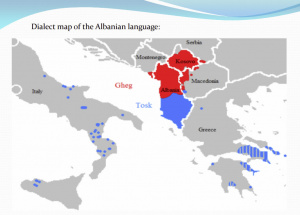Language/Tosk-albanian/Grammar/Pronouns
Hi Tosk Albanian learners! 😊
In this lesson, we will cover the topic of pronouns in Tosk Albanian grammar. Pronouns are one of the most important fundamentals to learn when studying any language. Once you get a hang of them, they will allow you to express yourself more clearly and effectively in conversations. Pronouns can be personal, possessive, reflexive, demonstrative, or relative.
Personal pronouns
Personal pronouns are used to replace the name of the person or persons being referred to. They can either take the form of the subject or the object of a sentence in Tosk Albanian. The table below lists the different personal pronouns and their corresponding English translations.
| Tosk Albanian | Pronunciation | English |
|---|---|---|
| Une | [unɛ] | I |
| Ti | [ti] | You (singular informal) |
| Ai | [aj] | He |
| Ajo | [ajɔ] | She |
| Ne | [nɛ] | We |
| Ju | [ju] | You (plural informal) |
| Ata | [ata] | They (masculine) |
| Ato | [atɔ] | They (feminine) |
Here is a dialogue example in Tosk Albanian so you can see the personal pronouns in action:
- Person 1: Si quhet? (What's your name?)
- Person 2: Une quhem Lila. Ti quhesh? (My name's Lila. What's your name?)
- Person 1: Quhem Artur. (My name's Artur.)
Possessive pronouns
Possessive pronouns are used to show possession or ownership in Tosk Albanian. These replace a noun and show that one person or thing belongs to another. The table below lists the different possessive pronouns in Tosk Albanian.
| Tosk Albanian | Pronunciation | English |
|---|---|---|
| Imi | [imɪ] | My |
| Yti | [jti] | Your (singular informal) |
| I tij | [i ti:j] | His |
| I saj | [i sa:j] | Hers |
| Joni | [jɔni] | Our |
| Yjoti | [jjo:tɪ] | Your (plural informal) |
| I tyre | [i tɪrɛ] | Their (masculine) |
| Ato | [atɔ] | Their (feminine) |
Here is a dialogue example in Tosk Albanian so you can see the possessive pronouns in action:
- Person 1: A është makinë juaj? (Is this your car?)
- Person 2: Jo, nuk është yjoti. (No, it's not your car.)
Reflexive pronouns
Reflexive pronouns refer back to the subject of a sentence. In Tosk Albanian, reflexive pronouns are formed by adding "vet" to the end of the corresponding personal pronoun. The table below lists the different reflexive pronouns in Tosk Albanian.
| Tosk Albanian | Pronunciation | English |
|---|---|---|
| Vet | [vɛt] | Myself |
| Vetë | [vɛtə] | Yourself (singular informal) |
| Vetën | [vɛtən] | Himself/Herself/Itself |
| Vetës | [vɛtəs] | Ourselves |
| Vetësini | [vɛtəsinɪ] | Yourselves (plural informal) |
| Vetër | [vɛtər] | Themselves |
Here is a dialogue example in Tosk Albanian so you can see the reflexive pronouns in action:
- Person 1: A mund ta bëni vetën? (Can you do it yourself?)
- Person 2: Po, unë mund ta bëj vetën. (Yes, I can do it myself.)
Demonstrative pronouns
Demonstrative pronouns are used to point out specific people, places, or things in Tosk Albanian. They can be either near or far. The table below lists the different demonstrative pronouns in Tosk Albanian.
| Tosk Albanian | Pronunciation | English |
|---|---|---|
| Ky | [kɪ] | This (masculine) |
| Kjo | [kjɔ] | This (feminine) |
| Këtu | [kətu] | Here |
| Aty | [aty] | There |
| Ai | [aj] | That (masculine) |
| Ajo | [ajɔ] | That (feminine) |
| Atje | [atjɛ] | Over there |
Here is a dialogue example in Tosk Albanian so you can see the demonstrative pronouns in action:
- Person 1: Kush e bleu këtë? (Who bought this?)
- Person 2: Ai e bleu këtë. (He bought this.)
Relative pronouns
Relative pronouns are used to connect phrases or clauses in a sentence in Tosk Albanian. They provide further information about a person or thing in the sentence. The table below lists the different relative pronouns in Tosk Albanian.
| Tosk Albanian | Pronunciation | English |
|---|---|---|
| Që | [cə] | That/Which/Who |
| Cili | [tsili] | Which/Who |
| Cilët | [tsilət] | Which/Who (plural) |
Here is a dialogue example in Tosk Albanian so you can see the relative pronouns in action:
- Person 1: Ky është personi që bëri diçka të shkëlqyeshme. (This is the person who did something amazing.)
- Person 2: Ah, ai person është shumë i zgjuar. (Ah, that person is very smart.)
Remember that there is no better way to learn a language than to practice with native speakers. To improve your [Language/Tosk-albanian|Tosk Albanian] Grammar, you can also use the Polyglot Club website. Find native speakers and ask them any questions!
Sources

